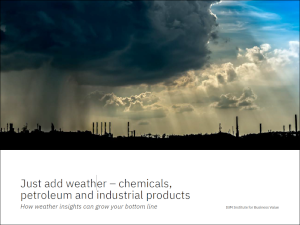Ungated Post | 01 Oct 2018
Just add weather – chemicals, petroleum, and industrial products: How weather insights can grow your bottom line

Even “normal weather” impacts the chemicals, petroleum and industrial products industries on a daily basis, whether through operations needs, critical infrastructure requirements or dangers for field workers. Some companies in these industries are reaping benefits from weather data by leveraging insights to reduce costs and increase revenues.
Weather-related damage can cause costly manufacturing equipment failures. Seasonal weather, including severe storms and hurricanes, can exert tremendous influence on natural gas demands. Weather-related perils cause hundreds of fatalities in the US alone, and over 100,000 worldwide each year. Monitoring these perils manually can reduce productivity and put workers at risk of injury. This report looks at ways we executives in the chemicals, petroleum and industrial products Industries can learn from those who view weather data as a competitive advantage.
To better understand how weather impacts organizations globally and across industries, Oxford Economics partnered with the IBM Institute for Business Value to survey 1,000 global C-level executives representing 13 industries and 15 countries. Of these participants, 150 were from the chemicals, petroleum and industrial products industries, the focus of this report.
Our Thought Leadership team produces original, evidence-based research made accessible to decision-makers and opinion leaders.
Oxford Economics’ team is expert at applying advanced economic tools that provide valuable insights into today’s most pressing business, financial, and policy issues.
Related Services

Post
Impact AI: Enterprise AI Maturity Index 2024
Oxford Economics and ServiceNow fielded a global survey of 4,470 executives at organizations where artificial intelligence capabilities are in use.
Find Out More
Post
The Hidden Costs of Downtime: The $400B problem facing the Global 2000
Downtime and service degradation create a cascade of consequences, costing Global 2000 companies $400B annually. But that figure doesn’t account for what’s below the surface. The actual cost is much larger when we consider downtime’s broader impacts.
Find Out More
Post
Global Pump Market Outlook 2024
The global pump market experienced a modest recovery in 2023. For 2024, we project a 2.5% growth in the market, reflecting a cautious optimism amid varied economic conditions.
Find Out More